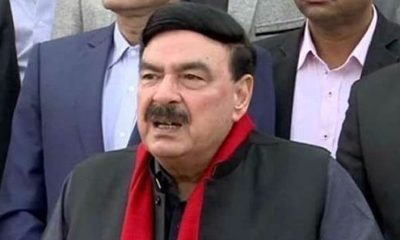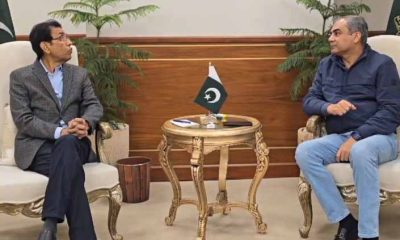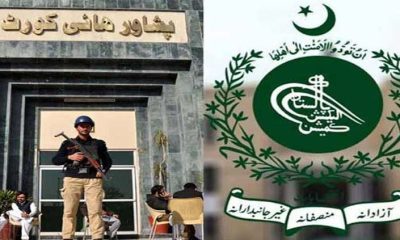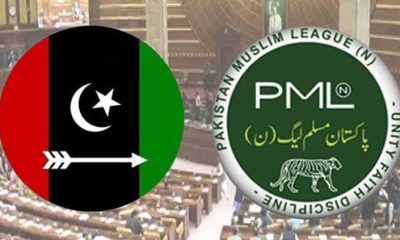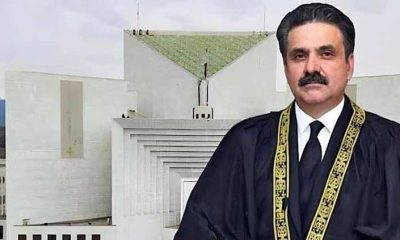pakistan
IICR hosts seminar on media’s impact, global perspectives

The Islamabad Institute of Conflict Resolution (IICR) has organised a seminar titled “Understanding the Impact of Media: Interpreting Information and Global Perspectives on Society.”
This event brought together scholars, media experts, and public policy professionals to discuss how media shapes societal concepts and political landscapes.
The seminar was moderated by Dr Shabana Fayyaz, Associate Professor at Quaid-e-Azam University Islamabad. Key speakers included former Senator Mushahid Hussain Syed, Dr Nazir Hussain, Air Marshal (retired) Farhat Hussain, former federal minister Murtaza Solangi, media expert Dr Farhan Rao, and investigative journalist Fakhar Kakakhel.
In her opening remarks, IICR Executive Director and founder, Sabah Aslam, emphasised the crucial link between media, public perceptions, and societal outcomes. She highlighted the importance of promoting media literacy, encouraging critical thinking, and especially urging the youth to use media responsibly.
The seminar aimed to assess the role of media in shaping narratives, eliminating misinformation, and promoting cultural understanding.
Former Senator Mushahid Hussain Syed discussed the role of the EU DisinfoLab in exposing India’s global propaganda campaign, citing examples such as ANI and the Srivastava Group. He highlighted the influence of Western media in historical and contemporary events like the 1953 Iranian revolution and the Iraq war. Commenting on the changing dynamics of media during the 2024 US elections, he stressed the need for a coordinated strategy to address media challenges in Pakistan.
Experienced journalist Murtaza Solangi discussed the fundamental principles of journalism and advocated for the public’s right to know. He identified corporate influence, market forces, and non-state actors as major challenges to media freedom and underscored the global pandemic of misinformation, stressing the importance of digital literacy to combat it.
Investigative journalist Fakhar Kakakhel spoke about the spread of “keyboard warriors” and Western-backed misinformation, which has created barriers to Pakistan’s development, particularly regarding CPEC. He called for better mechanisms to address digital chaos caused by censorship and misinformation.
Media expert Dr Farhan Rao highlighted the dangers of political hate speech, which deepens societal and cultural divides, and advocated for a multidisciplinary approach to tackling media-related challenges. He also emphasized the importance of promoting media literacy.
In his keynote address, Air Marshal (Retired) Farhat Hussain stressed the need to exploit India’s vulnerabilities, which are often magnified by Indian media. He underscored the importance of equipping individuals with critical thinking skills to distinguish between facts and propaganda, further stating the need to rationalize media regulations as media influence transcends national borders.
Dr Nazir Hussain, in his concluding remarks, discussed the growing role of social media, noting that due to the limited information provided by mainstream media, social media is gaining more attention. He attributed this trend to the corporate ownership of media houses.
pakistan
Dialogue unlikely to succeed, though I hope for positive outcome: Sheikh Rashid

Awami Muslim League chief and former federal interior minister Sheikh Rashid Ahmed has expressed doubts about the success of the ongoing political dialogue, though he hoped for a positive outcome.
Speaking to the media outside the Anti-Terrorism Court (ATC) in Rawalpindi, Rashid stated that successful talks could inspire hope in the nation.
However, he warned against turning the process into a joke. He emphasised that prisons were overcrowded, and the poor were suffering.
He called for negotiations to result in the release of political prisoners and the formation of a judicial commission.
Rashid reiterated his demand for a general amnesty for political detainees, noting that previous governments issued pardons in the past.
He warned that the current administration was under international pressure and risked further economic collapse. “The government lacks public support, and significant decisions must be made in the coming weeks,” he emphasised.
The former minister mentioned the numerous cases filed against him, stating that they have left him weary of life.
He advised the government to focus on street vendors rather than looking at the stock market.
pakistan
Khalid Maqbool calls on Interior Minister Naqvi to discuss overall political situation

Federal Minister for Education Khalid Maqbool Siddiqui on Tuesday called on Federal Minister for Interior and Narcotics Control Mohsin Naqvi here in Islamabad, Dunya news reported.
The duo discussed overall political situation of the country and matters of mutual interest. They also mulled over steps to give relief to the people and finding long-term solutions of the problems faced by the people.
“Pakistan’s economy is out of danger now as all economic indicators are positive. Disillusionment is a sin and people who spread hopelessness are working on a different agenda,” said Naqvi.
Siddiqui echoed the stance of the interior minister by saying those who create hindrances don’t care about well-being of the people of Pakistan.
pakistan
Peshawar High Court seeks ECP response over delay in Senate Elections

The Peshawar High Court has demanded a response from the Election Commission of Pakistan (ECP) regarding the delay in conducting Senate elections in Khyber Pakhtunkhwa.
A bench comprising Chief Justice Ishtiaq Ibrahim and Justice Waqar Ahmed heard the case filed by PTI leader Azam Swati, challenging the non-holding of Senate elections in the province.
During the hearing, the petitioner’s lawyer stated that a request had been submitted to conduct the Senate elections in Khyber Pakhtunkhwa.
The ECP’s counsel informed the court that consultations on the matter were still ongoing following a December 10 meeting. He further told that a revision petition on reserved seats was pending in the Supreme Court.
Chief Justice Ishtiaq Ibrahim granted the ECP two weeks to submit their response. However, when the ECP’s counsel requested additional time, the court expressed reluctance to allow indefinite delays.
The court emphasised the importance of adhering to a timeline and set January 16 as the deadline for the ECP’s reply, adjourning the hearing until then.
-

 Entertainment3 months ago
Entertainment3 months agoMovie Review: Helen Mirren tells a story of evil and hope during WWII in ‘White Bird’
-

 Entertainment3 months ago
Entertainment3 months agoDozens of health workers killed in Lebanon over past day, WHO says
-

 Business3 months ago
Business3 months agoRay-Ban maker EssilorLuxottica slams ‘grab bag’ lawsuits claiming eyewear monopoly
-

 pakistan2 months ago
pakistan2 months agoPunjab govt imposes Section 144 in five districts
-

 Business3 months ago
Business3 months agoGold scales fresh record high in Pakistan
-

 Entertainment3 months ago
Entertainment3 months agoGoosebumps and stars as Paris Fashion Week kicks off
-

 Entertainment2 months ago
Entertainment2 months agoBeyoncé leads the 2025 Grammy noms, becoming the most nominated artist in the show’s history
-

 Tech3 months ago
Tech3 months agoExploding pagers pose new threat but your phone is safe, experts say

